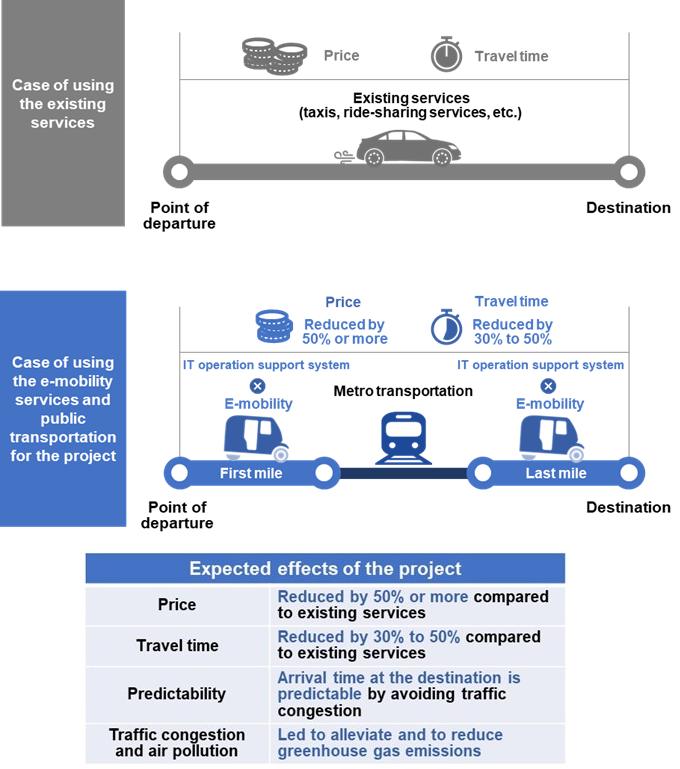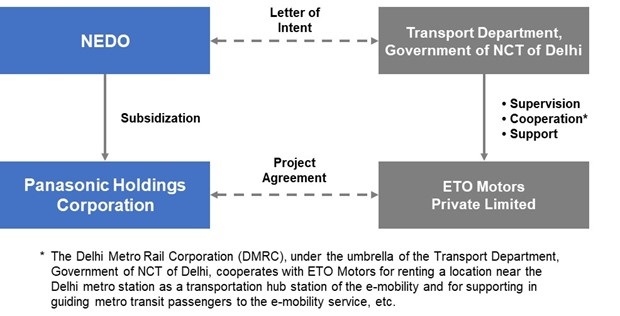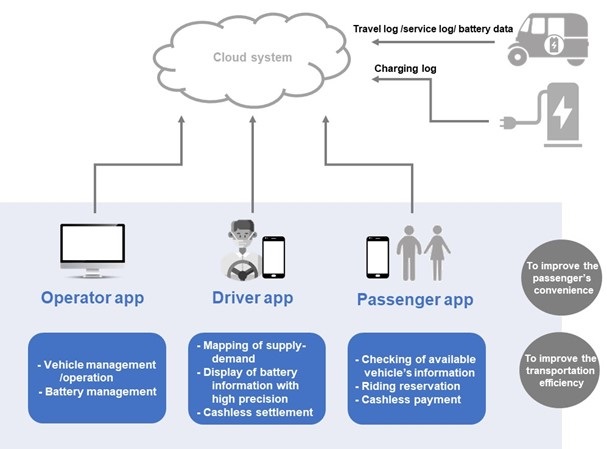Demonstration Project to realize Efficient Operation Support by IT System for Last Mile Transportation launched in India
—Aiming to improve Traffic Congestion and to reduce Green House Gas Emissions by enhancing Passenger's Convenience and Transportation Efficiency—
January 5, 2023
New Energy and Industrial Technology Development Organization (NEDO)
Panasonic Holdings Corporation
Translation of Japanese NEDO news release posted on December 26, 2022
The New Energy and Industrial Technology Development Organization (NEDO) and the Transport Department, Government of NCT of Delhi in India exchanged letters of Intent (LOI) in December to carry out a demonstration project, which is called International Demonstration Project on Japan's Energy Efficiency Technologies, on an IT operation support system for e-mobility (electric vehicles) with the aim of improving passenger's convenience and transportation efficiency in last mile transportation. Afterwards, Panasonic Holdings Corporation, a subsidized company for the project, and ETO Motors Private Limited (ETO Motors), a local cooperating company, jointly started the demonstration project for the IT operation support system for e-mobility in last mile transportation.
The project aims to enhance both passenger's convenience and transportation efficiency to increase the number of e-mobility users by introducing the IT operation support system to the e-mobility between point of departure, Kalkaji Mandir metro station and destination so it should result in improving traffic congestion and reducing greenhouse gas (hereinafter called "GHG") emissions.

Fig.1 Operation image of e-mobility*1 to which the IT operation support system
for last mile*2 transportation is applied and the expected effects of the
project (case example in the Indian urban area)
1. Overview
India has a population of about 1.4 billion and is a large market with a gross domestic product (GDP) growth rate of 8.7%*3 recorded in 2021. As its rapid economic growth continues, air pollution caused by traffic congestion, etc. has given rise to serious social problems, mainly in urban areas. In order to solve these problems, policies to promote the wide use of e-mobility (electric vehicles) and expansion of the metro network, both of which have a low environmental load, are being implemented. Furthermore, to promote the use of public transport such as the metro system, it is important to concurrently develop the transport infrastructure for the section (last mile) from the nearest station to the destination or from the point of departure to the nearest station.
However, the current last mile transportation, such as "auto-rickshaws" of three-wheeled vehicles running on natural gas and the e-mobility provides low convenience and reliability. Therefore, many people are using their own cars, taxis or ride-sharing service, etc., and directly moving from the riding point to the destination. The traffic methods with such low-density transportation have caused the serious traffic congestion and air pollution by the increase of traffic volume, and it has fallen into a downward spiral.
Under these circumstances, the New Energy and Industrial Technology Development Organization (NEDO) and the Transport Department, Government of NCT of Delhi in India exchanged letters of Intent (LOI) in December to carry out a demonstration project, which is called International Demonstration Project on Japan's Energy Efficiency Technologies*4, on an IT operation support system for e-mobility (electric vehicles) with the aim of improving passenger's convenience and transportation efficiency in last mile transportation. Afterwards, Panasonic Holdings Corporation (Panasonic HD), a subsidized company that is responsible for implementing the project, and ETO Motors Private Limited (ETO Motors), a local cooperating company that manufactures and operates e-mobility vehicles, have concluded a project agreement (PA) (see Fig. 2).
Subsequently, Panasonic HD and ETO Motors launched a demonstration project for the IT operation support system (hereinafter "the system") for e-mobility in last mile transportation in an area around the Kalkaji Mandir metro station.
In this project, Panasonic HD and ETO Motors will jointly introduce the system to e-mobility services for last mile transportation between the point of departure, the Kalkaji Mandir metro station and the destination. The project aims to enhance both passenger's convenience and transportation efficiency to increase the number of e-mobility users by introducing the IT operation support system to the e-mobility between point of departure, Kalkaji Mandir metro station and destination so it should result in improving traffic congestion and reducing GHG emissions *5 (see Fig. 1).
- [Implementation scheme of the demonstration project]
- Subsidized company:Panasonic Holdings Corporation
- Local cooperating company:ETO Motors Private Limited
- Implementation location:Area around the Kalkaji Mandir metro station in Delhi
-

Fig. 2 Project implementation scheme
2. Details of the IT operation support system for e-mobility and the demonstration project
The IT operation support system introduced in the demonstration project is a cloud system having functions of on-demand service schedule management, vehicle arrangement algorithms and battery management. The cloud system loads the authentication information to use e-mobility charger and the information on e-mobility vehicle/operation to the system by mobile communication, and provides the following functions via three apps (applications) for operators (vehicle service operators), drivers and passengers, respectively (see Fig.3).
- (1) Operator app:
- Vehicle management / operation, battery management
- (2) Driver app:
- Mapping of supply-demand, display of battery information with high-precision,
cashless settlement - (3) User app:
- Checking of available vehicle’s information, riding reservation,
cashless payment
-

Fig. 3 Overview of the IT operation support system in the demonstration project
In the demonstration project, the expected effects such as the increase in passenger numbers, the improved operational efficiency (increase of vehicle operating time, decrease of time required for reaching the destination) and the reduction in operation cost (decrease of operation vehicle, increase of battery usage time) are verified by monitoring each effect, through the e-mobility operation in which the above three apps are introduced to the operator, drivers and passengers respectively. By optimizing the system operations based on the verification results, it is expected to improve the passenger's convenience and transportation efficiency in last mile transportation and to increase drivers' earnings due to the increase of passengers to use the e-mobility.
[Notes]
- *1 E-mobility (electric vehicles)
- E-mobility is an abbreviation of "electro-mobility", means electric vehicles. It is a generic term for electric vehicles (EV), electric motorcycles, electric buses, electric trucks, and so on.
- *2 Last mile
- Last mile is an abbreviation of "last one mile." In the field of transportation, it means the section from the nearest station to the destination. In this news release, it also includes the section from a point of departure to the nearest station (first one mile).
- *3 A gross domestic product (GDP) growth rate of 8.7% in 2021
- The data is an estimate of the annual GDP growth rate in 2021 that was released by the Ministry of Statistics and Programme Implementation (MoSPI) in India.
- *4 International Demonstration Project on Japan's Energy Efficiency Technologies
-
- Project name:International Demonstration Project on Japan's Energy Efficiency Technologies / Demonstration project for IT system to realize efficient operation management of e-mobility for last-mile transportation in India [Subsidization project]
- Project period:FY2021 to FY2023
- Project overview:
 International Demonstration Project on Japan's Energy Efficiency Technologies
International Demonstration Project on Japan's Energy Efficiency Technologies
- *5 Reduction of greenhouse gas (GHG) emissions
- By introducing the IT operation support system in the demonstration project, it is expected to reduce the direct movement from the riding point to the destination by using private cars, taxis, ride-sharing services, etc., and to promote efficient movement using metro transportation and e-mobility. In the project, the annual reduction of CO2 emissions in the last mile section is assumed to be about 260 tons when using 40 e-mobility units.
3. For more information, please contact:
Smart Community Energy System Department, NEDO
Tel: +81-44-520-5274
Mobility Business Strategy Office, Panasonic Holdings Corporation
E-mail:mobility_info[*]ml.jp.panasonic.com
* To send an inquiry by email, please replace [*] with @ in the above email address.
